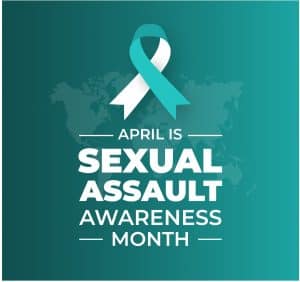Protecting Workers During National Sexual Assault Awareness and Prevention Month

According to the Equal Employment Opportunity Commission (EEOC), there were 305,888 workplace sexual harassment charges filed from 1997 to 2021. In fact, California is one of the top five states with the most reported cases in the last 25 years.
The breadth of how many people who have actually been victimized is likely much larger than that—and it really came to light during the #MeToo movement in 2017. Sexual assault and harassment are prevalent issues that affect people who work across all industries, but some industries tend to have higher reported rates than others.
Understanding the magnitude of workplace sexual assault
Sexual assault and harassment are serious issues that affect individuals in all industries and at all levels of employment. It can take many different forms, from physical assault to rape, and can be committed by colleagues, supervisors, or even clients or customers. The effects of workplace sexual harassment can be long-lasting and profound, including mental and physical health problems, decreased productivity and job satisfaction, and even career derailment. Since sexual assault can happen at any job, it’s important to know in which industries it happens most often in order to put a stop to it.
Hospitality, restaurants, and retail
According to an article that did a deep dive on some EEOC statistics, the accommodation and food services, as well as the retail trade industries, are responsible for a quarter of all workplace sexual harassment reports. After reporting it, 75% of victims in these industries also describe experiencing some form of retaliation. A staggering 90% of women in the restaurant industry report encountering sexual advances, with half of these incidents occurring weekly. Meanwhile, 70% of men working in the same industry report experiencing some form of sexual harassment. In the end, many people—but mostly women—actually left their jobs after being subjected to unwanted sexual advances.
Healthcare
The healthcare and social assistance industry has become a hotbed for sexual harassment, accounting for 11.48% of all reports filed with the EEOC. Disturbingly, the nursing industry in particular, has an incredibly high rate of sexual harassment with 60% of nurses saying they experience it while on the job. Shockingly, only 27% of them choose to report it to their employer. Gender-wise, the numbers are equally alarming, with 62% of female nurses and 51% of male nurses reporting sexual harassment incidents—but only 17% of male nurses actually report these incidents to management compared to 29% of female nurses who do so. Verbal, physical, and visual harassment are the most common types of harassment experienced by nurses, accounting for 56%, 37%, and 29% of all cases, respectively.
Disturbingly, 58% of nurses have experienced harassment from patients, and 26% have experienced it from medical colleagues and 24% from nursing colleagues. In addition, 19% of nurses have reported experiencing harassment from patients’ families or friends, a trend that is unacceptable and must be addressed.
Academia
While many people would not necessarily think of it, sexual harassment is also a pervasive issue in the academic world. There’s a hierarchical power dynamic and gender disparity which may contribute to many of the incidents. In fact, 58% of those in the academic workplace, including students, faculty, and staff, have experienced sexual harassment. Shockingly, women aged 18-24 who are enrolled in college are three times more likely to be victims of sexual assault than any other group of women. Unfortunately, many instances of harassment go unreported. A survey of college students revealed that 56% of students who were harassed didn’t report it because they didn’t consider it a big deal, while 22% didn’t want to draw negative attention to themselves.
Military
Sexual harassment and assault remain a significant problem in the military to this day, where there are also clear ranks of power in place. Unbelievably, 60% of sexual harassment cases in the military are attributed to a supervisor or leader and women are almost five times more likely to experience sexual assault than men. Digging deeper, statistics also reveal that 41% of women and 4% of men military veterans have admitted to experiencing sexual harassment or assault. Among active-duty personnel, 23% of women have reported experiencing sexual harassment, while only 4% of men have. Sadly, 52% of these women who reported their assault said they faced some form of retaliation, whether social or professional.
If you are a victim of sexual assault in Los Angeles, you don’t have to fight the legal battle alone. An experienced sexual assault attorney with knowledge in handling cases like these will guide you through the legal process and fight for justice. Your attorney can gather evidence, interview witnesses, and negotiate with insurance companies or opposing counsel. They can also represent you in court and help you win the compensation you deserve for the damages caused by the assault. This can include:
- Medical bills
- Lost wages
- Emotional distress
- Physical injuries
In some cases, survivors may be entitled to punitive damages as well.
At Taylor & Ring, we have a team of experienced attorneys who specialize in Los Angeles sexual assault cases, and we are dedicated to providing our clients with the support and legal representation they need to achieve a favorable outcome. We understand the devastating impact that sexual assault can have on a victim’s life, and we will work tirelessly to hold the responsible parties accountable for their actions. If you are in Los Angeles and have experienced sexual assault in the workplace, don’t hesitate to reach out to us. We are here to help you get the justice and compensation you deserve. Please call our office or fill out our contact form to schedule a consultation today.

John C. Taylor is one of the most accomplished and nationally recognized trial lawyers in California. The broad variety of cases he has tried during his career is matched by few attorneys, trying more than 125 cases to verdict, including: police shootings and civil rights, sexual abuse, serious personal injury, wrongful death, products liability, insurance bad faith, and employment.
Read more about John C. Taylor.

